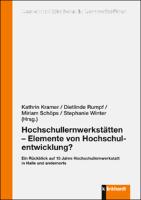Hochschullernwerkstätten – Elemente von Hochschulentwicklung?
Ein Rückblick auf 15 Jahre Hochschullernwerkstatt in Halle und andernorts
Contributor(s)
Kramer, Kathrin (editor)
Rumpf, Dietlinde (editor)
Schöps, Miriam (editor)
Winter, Stephanie (editor)
Language
GermanAbstract
One claim of learning workshops is to participate in the development of the respective institution. This volume shows the importance of higher education learning workshops for the shaping of higher education landscape(s) and focuses on five topics: What historical developments can be identified? What shapes the self-understandings in higher education learning workshops? How can colleges and universities participate in processes of inclusion/exclusion in higher education learning workshops? What specific perspectives become apparent in relation to professionalisation and reflection? To what extent can cooperation and cooperative learning within university learning workshops be transferred to other university areas? Ein Anspruch von Lernwerkstätten ist es, an der Entwicklung der jeweiligen Institution mitzuwirken. Der Band zeigt die Bedeutung von Hochschullernwerkstätten für die Gestaltung von Hochschullandschaft(en) und fokussiert fünf Themenbereiche: Welche historischen Entwicklungen lassen sich feststellen? Wodurch werden die Selbstverständnisse in Hochschullernwerkstätten geprägt? Wie können Hochschulen und Universitäten von Prozessen der Inklusion / Exklusion in Hochschullernwerkstätten partizipieren? Welche spezifischen Perspektiven werden in Bezug auf Professionalisierung und Reflexion deutlich? Inwiefern können Kooperationen und kooperatives Lernen innerhalb von Hochschullernwerkstätten auf andere universitäre Bereiche übertragen werden? (DIPF/Orig.)
Keywords
Lernwerkstatt, Hochschule, Hochschullehre, Lernen, Hochschulentwicklung, Geschichte <Histor>, Selbstverständnis, Inklusion, Partizipation, Universität, Professionalisierung, Reflexion <Phil>, Kooperation, Kooperatives Lernen, Hochschuldidaktik, Erziehungswissenschaft, Entwicklung, Einflussfaktor, Sekundarbereich, Bildungspolitik, Konzeption, Erziehungswissenschaftliche Fakultät, Studiengang, Digitalisierung, Lernumgebung, Raum, Netzwerk, Lehrerausbildung, Interessenvertretung, Internationale Zusammenarbeit, Digitale Medien, Medieneinsatz, Entdeckendes Lernen, Druckerei, Freinet-Pädagogik, Buchdruck, Schriftkultur, Erfahrungsraum, Buchherstellung, Lehramtsstudiengang, Schreiben, Lehramtsstudentin, Erwartungshaltung, Theorie-Praxis-Beziehung, Lernbegleitung, Berufsbiografie, Praxisbezug, Selbstwahrnehmung, Selbstreflexion, Emotionales Lernen, Dozent, Veranstaltung, Lernangebot, Lernprozess, Geschichtsunterricht, Forschendes Lernen, Fachdidaktik, Lernmaterial, Integrationskonzept, Finanzierung, Berufliche Integration, Menschenrechte, Hochschulseminar, Selbstorganisation, Demokratische Bildung, Internationaler Austausch, Integrative Pädagogik, Sonderpädagogik, Konzept, Heterogenität, Lehrerbildung, Schulentwicklung, Sachunterricht, Interdisziplinarität, Reflexivität, Praxissemester, Selbsterfahrung, Lehrsituation, Lernsituation, Mathematikunterricht, Frühpädagogik, Biografisches Lernen, Kindheit, Didaktik, Lehrer, Rollenverteilung, Lehrerrolle, Inszenierung, Lernmotivation, Rollenverständnis, Erzieher, Erzieherrolle, Rollenverhalten, Student, Kind, Kasuistik, Lehr-Lern-Forschung, Hochschulkooperation, Interdisziplinäre Zusammenarbeit, Material, Objekt, Didaktisches Material, Unterrichtsforschung, Unterricht, Biografisches Interview, Fallbeispiel, Methode, Biografische Methode, Aufsatzsammlung, Halle <Saale>, Halle-Wittenberg, Berlin, Bielefeld, Hannover, Siegen, Emden, Sachsen-Anhalt, Saarland, Deutschland, Bozen, Südtirol, ItalienDOI
10.35468/5858ISBN
9783781524231, 9783781558588, 9783781524231Publisher
Verlag Julius KlinkhardtPublication date and place
Bad Heilbrunn, 2020Series
Lernen und Studieren in Lernwerkstätten,Classification
Education


 Download
Download Web Shop
Web Shop